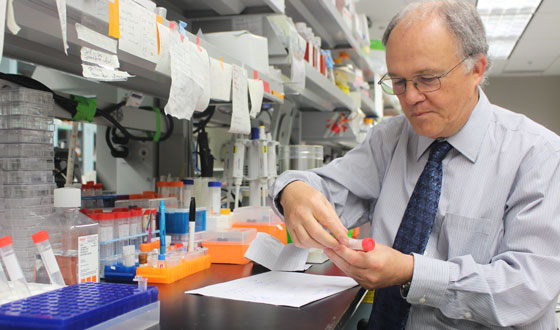
Dr. Don Weaver, Director of the Krembil Research Institute, has written in his poems about the devastating impacts Alzheimer’s disease has on patients and their families. (Photo: UHN)
I
A family mourns their mother dear,
Lament her shattered mind with tear,
Each dwindling day — a struggled strife,
That pits and pocks her AD life.
Alzheimer's hard and hateful stain,
As AD taints her thought, her brain,
Its tangled web in brain, of mind,
Harsh tragedy of humankind.
So begins the poem "Alzheimer's disease, True enemy of humankind," written by the Director of the Krembil Research Institute, Dr. Donald Weaver, and published this month in the journal of the
American Academy of Neurology.
A clinical and scientific expert in Alzheimer's disease (AD), Dr. Weaver sees firsthand the devastating effect this neurodegenerative illness has on patients and families – a theme he has expressed in several poems, many of them published in academic journals.
"Writing poetry is a bit of a therapeutic process for me," he says. "I see many families in my clinic, adult children whose mother or father is essentially disappearing before their eyes, or couples who no longer recognize each other after 50 years of marriage, and witnessing these families being robbed of their loved ones by this disease takes an emotional toll on everyone."
Dementing minds leave tales untold,
As tau and amyloid misfold,
Vile enemies that twist within;
A war for her which we must win.
To purge from her this enemy,
And make AD a memory;
A threat upon her mental wealth,
Appalling risk to aging health.
To cure her brain, and help our race,
We need to touch sweet Nature's face.
The poems have also been therapeutic for patients and families around the world who – when he last published an AD poem in 2014 – contacted him to say how much his words captured and expressed what they were going through.
A family mourns their mother dear,
Lament her shattered mind with tear,
Each dwindling day — a struggled strife,
That pits and pocks her AD life.
Alzheimer's hard and hateful stain,
As AD taints her thought, her brain,
Its tangled web in brain, of mind,
Harsh tragedy of humankind.
Dementing minds leave tales untold,
As tau and amyloid misfold,
Vile enemies that twist within;
A war for her which we must win.
To purge from her this enemy,
And make AD a memory;
A threat upon her mental wealth,
Appalling risk to aging health.
To cure her brain, and help our race,
We need to touch sweet Nature's face.
Emotion born of human mind:
Ecstatic joy, eureka find,
Idyllic hope, a caring day,
And love — from lust to agapé.
Creation born of human brain:
Jane Eyre, Macbeth, and Clemens' Twain,
Sweet poignancy in prose and play,
And art—from Mozart to Monet.
These glories of our life, our race,
Grand triumph of our brain's time-space;
Diseases of our brain and mind,
True enemy of humankind.
We must embrace, research, and strive,
We must caress the tragic lives
Of those AD afflicts, invades,
Protein and mind misfold, pervades.
To cure AD, the mind, the brain,
With scientific hand humane.
Dr. Weaver reads his latest poem: “Alzheimer’s disease, True enemy of humankind”
"People who see a parent or loved one suffer with AD don't always know what emotions they should be feeling or allowed to feel," says Dr. Weaver, who is also a neurologist at Toronto Western Hospital. "I'm glad these poems are helping to validate those feelings of sorrow and confusion because we need people to know that it's ok to have these feelings."
II
Emotion born of human mind:
Ecstatic joy, eureka find,
Idyllic hope, a caring day,
And love — from lust to agapé.
Creation born of human brain:
Jane Eyre, Macbeth, and Clemens' Twain,
Sweet poignancy in prose and play,
And art—from Mozart to Monet.

Dr. Weaver calls writing poetry "a bit of a therapeutic process for me." (Photo: UHN)
However, although Dr. Weaver can eloquently relate the emotional turmoil unleashed by Alzheimer's disease, he is also working diligently in his research lab to put an end to it. As the poem suggests, the brain needs a cure for Alzheimer's disease and Dr. Weaver may be close to finding it.
For the second year in a row, Dr. Weaver and his research team have been invited by the Alzheimer's Association International Conference (AAIC) to present their latest research findings on a potential drug that appears to slow the progression of the disease. This year's conference is being held in Toronto this week.
Last year, Dr. Weaver's lab – working in the Krembil Discovery Tower under the company name Treventis Corp. –
identified a shape found in both beta-amyloid and tau: the two proteins that cause Alzheimer's when they malfunction.
This shape, which they called the Common Conformational Motif (CCM), gives the proteins the capacity to misfold and, as they do so, clump together to cause the signature plaques and tangles of AD. With this common shape identified, they then looked through a database of millions drug compounds that would block this misfolding and narrowed it down to two.
This year, the team has taken this research further, showing they have not only identified a better drug compound to inhibit the misfolding proteins, but they have also demonstrated that the compound reduces the presence of beta-amyloid and tau in the brain by 40 per cent when given consistently.
These glories of our life, our race,
Grand triumph of our brain's time-space;
Diseases of our brain and mind,
True enemy of humankind.
We must embrace, research, and strive,
We must caress the tragic lives
Of those AD afflicts, invades,
Protein and mind misfold, pervades.
Though still in the lab stage of research, the team hopes to bring this drug compound to the clinical trial stage within 12 months. And if they are able to replicate these findings at the clinical level, Dr. Weaver's work will essentially lead to a pill a day to keep Alzheimer's at bay.
Or to put it more poetically:
To cure AD, the mind, the brain,
With scientific hand humane.
